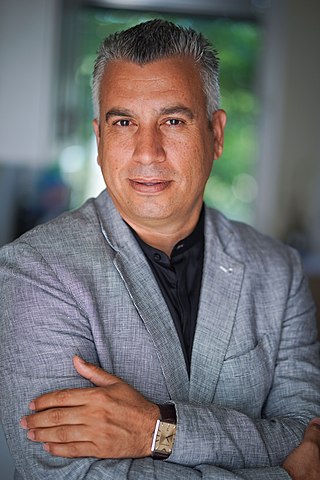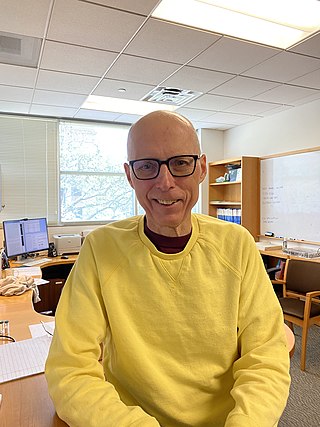Biography
He studied at the University Pierre et Marie Curie in Paris (BsC 1983 and obtained his MsC in chemistry in 1986 and his PhD under the supervision of Prof. Jean Normant in December 1988). He then spent a year at the Catholic University of Louvain, Belgium, for a postdoctoral stay with Professor Leon Ghosez (1989). He was recruited at the CNRS (Centre National de la Recherche Scientifique) in 1990 at the University Pierre et Marie Curie in Paris, received his habilitation in 1995 and moved in September 1997 to the Technion - Israel Institute of Technology as an Assistant Professor. He was promoted to Associate Professor in 2000 and Professor in 2004. [2] [3] Since 2005, he holds the Sir Michael and Lady Sobell Academic Chair. He has been Visiting Professor at Tokyo University Institute of Technology (Japan), the University of Montreal (2006, Canada), the University of Strasbourg (France), the University of Paris-Descartes (2010, France), the California Institute of Technology (Caltech, United States), the University of Montpellier (2011, France),Taïwan Science Council (2011) the University of Osaka Prefecture (2015, Japan), Wilhems-University Munster, (2015, Germany) and Taïwan National Council (2017). [1]
Ilan Marek is the author of numerous publications (more than 240 in international journals). [4] [5]
He is the recipient of numerous international awards for academic excellence and for excellence in teaching. He is a member of the editorial board of more than ten scientific journals. [6]
Member of scientific committees and associate publisher
Ilan Marek is editorial board member in many different journals such as Chemical Communications, (RSC); Organic and Biomolecular Chemistry, (RSC); European Journal of Organic Chemistry, (WILEY-VCH); The Chemical Record, (Wiley-VCH); Advanced Synthesis and Catalysis, (Wiley-VCH); Synthesis, (Thieme ); Synlett, Thieme; Angewandte Chemie International Edition, (WILEY-VCH); Chemistry, A European Journal, (WILEY-VCH); Helvetica, (WILEY-VCH); Chemical Reviews (ACS); ACS Central Science (ACS).
He is editor of numerous journals and revues : Comprehensive Organic Synthesis (Second Edition. Elsevier); Beilstein Journal of Organic Chemistry; Israel Journal of Chemistry, (Wiley-VCH); Tetrahedron (Elsevier); “The Chemistry of Functional groups” Patai series, (WILEY-Chichester).
Distinctions and honours
Ilan Marek has been elected several times as an excellent teacher and received the Yannai Award for excellence in teaching (2016).
He has won numerous awards and among them, the French Chemical Society Award - Acros for young chemist under 40 years old (1997); the Yigal Alon Fellowship (1998); the Henry Gutwirth Foundation Award (1998); the Klein Award for the development of original synthetic methods (1999); the Yosefa and Leonid Allschwang Award, Israel Science Foundation (ISF 2000); the Michael Bruno Award, Rothschild Foundation (2002); the best Young Chemist Award, Israel Chemical Society (2003); the Bessel Award, Humboldt Foundation (2005); the Henry Taub Prize for Academic Excellence (2009); the Germany-Technion Prize for Academic Excellence (2010); the Schulich Prize for the Promotion of Extraordinary Academic Activities (2010); the Royal Society Chemistry Prize in Organometallic Chemistry (UK, 2011); the Janssen Pharmaceutics Prize for Creativity in Organic Synthesis (2012); the Israel Chemical Society Prize of Excellence (2014); the Weizmann Prize for exact Sciences (2015).
Ilan Marek received twice the ERC Advanced Research Grant (in 2013 and 2018). He was the President of the Bürgenstock meeting in 2018. He has been elected member of the French Academy of sciences in 2017 [2] [7] [6] and at the Israel Academy of Sciences and Humanities in 2019. [8]

George Andrew Olah was a Hungarian-American chemist. His research involved the generation and reactivity of carbocations via superacids. For this research, Olah was awarded a Nobel Prize in Chemistry in 1994 "for his contribution to carbocation chemistry." He was also awarded the Priestley Medal, the highest honor granted by the American Chemical Society and F.A. Cotton Medal for Excellence in Chemical Research of the American Chemical Society in 1996.

Kyriacos Costa Nicolaou is a Cypriot-American chemist known for his research in the area of natural products total synthesis. He is currently Harry C. and Olga K. Wiess Professor of Chemistry at Rice University, having previously held academic positions at The Scripps Research Institute/UC San Diego and the University of Pennsylvania.

Kendall Newcomb Houk is a Distinguished Research Professor in Organic Chemistry at the University of California, Los Angeles. His research group studies organic, organometallic, and biological reactions using the tools of computational chemistry. This work involves quantum mechanical calculations, often with density functional theory, and molecular dynamics, either quantum dynamics for small systems or force fields such as AMBER, for solution and protein simulations.
Tobin Jay Marks is an inorganic chemistry Professor, the Vladimir N. Ipatieff Professor of Catalytic Chemistry, Professor of Material Science and Engineering, Professor of Chemical and Biological Engineering, and Professor of Applied Physics at Northwestern University in Evanston, Illinois. Among the themes of his research are synthetic organo-f-element and early-transition metal organometallic chemistry, polymer chemistry, materials chemistry, homogeneous and heterogeneous catalysis, molecule-based photonic materials, superconductivity, metal-organic chemical vapor deposition, and biological aspects of transition metal chemistry.

François Diederich was a Luxembourgian chemist specializing in organic chemistry.
Robert George Bergman is an American chemist. He is Professor of the Graduate School and Gerald E. K. Branch Distinguished Professor Emeritus at the University of California, Berkeley.

Krzysztof "Kris" Matyjaszewski is a Polish-American chemist. He is the J.C. Warner Professor of the Natural Sciences at the Carnegie Mellon University Matyjaszewski is best known for the discovery of atom transfer radical polymerization (ATRP), a novel method of polymer synthesis that has revolutionized the way macromolecules are made.

Peter John Stang is a German American chemist and Distinguished Professor of chemistry at the University of Utah. He was the editor-in-chief of the Journal of the American Chemical Society from 2002 to 2020.
Kyoko Nozaki is a Japanese chemist and Professor of Chemistry at University of Tokyo in Japan.
Joseph B. Lambert is an educator, organic chemist, archaeological chemist, and nuclear magnetic resonance spectroscopist. He grew up in the San Antonio, Texas, area and graduated from Alamo Heights High School in 1958. He was educated at Yale University, where he worked for William von Eggers Doering, and at California Institute of Technology (1965), where he worked for John D. Roberts. In 1965, he joined the faculty of Northwestern University in Evanston, Illinois, where he rose through the ranks and in 1991 became Clare Hamilton Hall Professor of Chemistry. In 2010, he retired after 45 years at Northwestern and moved to Trinity University in San Antonio to assume his current position as Research Professor of Chemistry.

Phil S. Baran is a Professor in the Department of Chemistry at the Scripps Research Institute and Member of the Skaggs Institute for Chemical Biology. Baran has authored over 130 published scientific articles. He has several patents. His work is focused on synthesizing complex organic compounds, the development of new reactions, and the development of new reagents.
Stephen L. Buchwald is a U.S. chemist and Camille Dreyfus Professor of Chemistry at MIT. He is known for his involvement in the development of the Buchwald-Hartwig amination and the discovery of the dialkylbiaryl phosphine ligand family for promoting this reaction and related transformations. He was elected as a fellow of the American Academy of Arts and Sciences and as a member of the National Academy of Sciences in 2000 and 2008, respectively.
Alfred Hassner is an internationally known organic chemist.
Ganugapati Sree Rama Subba Rao is an Indian natural product chemist and a former chair of the department of sciences at the Indian Institute of Science (IISc). He is known for his researches on dihydroaromatics obtained through Birch reduction of aromatic compounds and is an elected fellow of the Indian National Science Academy, and the Indian Academy of Sciences. The Council of Scientific and Industrial Research, the apex agency of the Government of India for scientific research, awarded him the Shanti Swarup Bhatnagar Prize for Science and Technology, one of the highest Indian science awards, in 1982, for his contributions to chemical sciences.
Govindasamy Mugesh is an Indian inorganic and physical chemist, a professor and the head of the Mugesh Laboratory attached to the department of Inorganic and Physical Chemistry at the Indian Institute of Science. He is known for his studies on mechanism of thyroid hormone action and is an elected fellow of the Indian Academy of Sciences, Indian National Science Academy, Royal Society of Chemistry and the National Academy of Sciences, India. The Council of Scientific and Industrial Research, the apex agency of the Government of India for scientific research, awarded him the Shanti Swarup Bhatnagar Prize for Science and Technology, one of the highest Indian science awards, in 2012, for his contributions to chemical sciences. In 2019, he was awarded the Infosys Prize in Physical Sciences for his seminal work in the chemical synthesis of small molecules and nanomaterials for biomedical applications.

Erick M. Carreira is a Cuban-born American organic chemist and professor at ETH Zürich. He is known for his research group's work in total synthesis projects, particularly asymmetric synthesis of complex natural products. He became the editor-in-chief of the Journal of the American Chemical Society in 2021.

Doron Aurbach is an Israeli electrochemist, materials and surface scientist.

Ashraf Brik is a full professor at the Schulich Faculty of Chemistry at the Technion Institute of Technology, Israel. His laboratory specializes in developing synthetic methods for chemical synthesis of proteins with post-translational modifications (PTMs) in quantities that allow for them to be studied thoroughly. Brik's group is developing novel modulators based on small molecules, peptides and peptidomimetics, to influence enzymes and proteins involved in various diseases. With the help of these tools, it is possible to understand how molecules and biological systems affect health.

John A. Gladysz, an organometallic chemist, is a Distinguished Professor and holds the Dow Chair in Chemical Invention at Texas A&M University. Professor Gladysz is a native of the Kalamazoo, Michigan area. He obtained his B.S. degree from the University of Michigan (1971) and his Ph.D. degree from Stanford University (1974). He subsequently held faculty positions at UCLA (1974-1982) and the University of Utah (1982-1998). He then accepted the Chair of Organic Chemistry at the University of Erlangen-Nuremberg in Germany. In 2008, he returned to North America as a distinguished professor and holder of the Dow Chair in Chemical Invention at Texas A&M University.
Akkattu T. Biju is an Indian scientist who is an associate professor in the Department of Organic Chemistry at the Indian Institute of Science, Bengaluru. He was awarded the Shanti Swarup Bhatnagar Prize, Indian national award for excellence in scientific research, for Chemical Sciences for the year 2022, for his work on transition-metal-free carbon-carbon and carbon-heteroatom bond-forming reactions using aryne chemistry and carbene-based organocatalysis.











